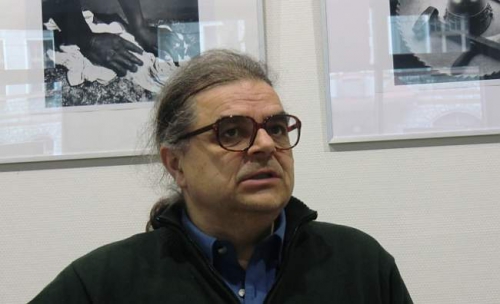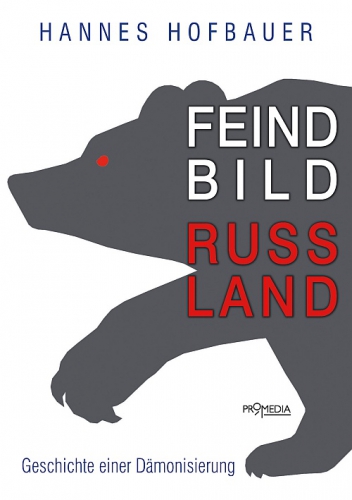vendredi, 10 juin 2016
Interview: A history of russophobia – as seen by Hannes Hofbauer

Interview: A history of russophobia – as seen by Hannes Hofbauer
Ex: https://gianalytics.org
Austrian author Hannes Hofbauer specializes in deconstruction of Western „demonization“ narratives. Following his books on the Yugoslav wars, his focus has turned to the economic and geopolitical roots of today’s „Russia-bashing“ in the West.
The Western media and politicians, Hofbauer says, are addressing the Russians as an „anonymous mass, using insulting attributes that express distance distance, detestation, and hate.“ He questions the reasons behind decisions by Washington and Brussels to “deny entry permits for Russian diplomats, inflict sanctions, close accounts of Russian citizens, exclude Moscow from international organizations, boycott sports events and disrespect people who plead for understanding Russian positions and politics.”
 Hofbauer argues that the “enemy image paradigm dominates the reception of Russia, Russians, and Russian politics throughout the centuries, although short periods of a positive image existed in between”, but also that the current “demonisation of Russia by the West is a reaction to the Kremlin’s policy to consolidate the state and pursue a sovereign foreign policy”.
Hofbauer argues that the “enemy image paradigm dominates the reception of Russia, Russians, and Russian politics throughout the centuries, although short periods of a positive image existed in between”, but also that the current “demonisation of Russia by the West is a reaction to the Kremlin’s policy to consolidate the state and pursue a sovereign foreign policy”.
According to him, the “new enemy image developed along different occasions: the NATO-war on Yugoslavia (1999), the case of Mikhail Khodorkovsky as well as the US war on Iraq (2003), the Eastern enlargement of NATO and European Union (since 1999 - 2004), the wars in South Ossetia and Abkhasia (2008) and – most important and long-lasting – the struggle over Ukraine’s international orientation, beginning with the EU Association Agreement in November 2013”.
In an interview for GIA, Hofbauer outlines the current state and perspectives of Russophobia.
Why is Russia considered as a sort of “superpower pariah state” by the West?
This is a question of historical and political context. Let’s have a look at the recent history since the breakdown of the Soviet Union. Gorbachev and - even more so - Yeltsin were darlings of Western media and Western politicians. And so Russia’s image was drawn as a friendly state on its way to democracy. Nobody in the West cared about the fact that Yeltsin attacked the White House in Moscow with artillery in October 1993 to get rid of a Duma that rejected his policies. And when he introduced a strong presidential system, the West applauded. Now Putin is using this system and Western commentators speak of autocracy. There is a crucial difference in the Western reception of Russia during the 1990s and after the year 2000. During the 1990s the Kremlin under Yeltsin helped to unmake the state-structures, while after 2000 Putin rebuilt and strengthened these structures in administrative, territorial, and socio-economic respects. This is why the Kremlin and Russia are perceived as an enemy in the West.
What are the roots of Russophobia in the West?
In my book “Enemy Image Russia”, which came out some weeks ago in the German language, I trace the Western Russophobia back to the late 15th century. At this turning point of history, Ivan III consolidated the state against Tatar invasions and geopolitically tried to do what every Russian leader has been doing ever since: to obtain or defend access to the sea for a land-locked country. On his way to the Baltic Sea, he clashed with the Teutonic Order and the Lithuanian-Polish Union. It was not by accident that the German-Polish philosopher Johannes von Glogau from the University of Krakow was the first to taint Russians as “Asiatic, barbaric, non-believers, and dirty”. This image since then became a stereotype over the centuries.
If you like, Russophobia is rooted in the geopolitical fact that Russia wants to have access to the sea and the West always tries to counter this move. Already before the First World War the well-known geographer and founder of the London School of Economics, Halford Mackinder, based his Heartland-theory on this geopolitical conflict. His theory explains why it is necessary and how it is possible for Western powers to rule over or at least control the “heartland” (Russia). It led to justifying aggressive German Nazi geopolitical visions which came later, such as the one of Alfons Paquet (in the 1940s), as well as to the politics of containment, invented by Nicholas Spykman and realized by Henry Truman (in the 1950s), which found a successor in the adviser of several US presidents, Zbigniew Brezinski (in the 1980s).
Was this Russophobia always a constant throughout history? Were there periods of relaxation?
No, it was not, although we have to say that most of the time, Russia-bashing was usual. In the mercantilist era, when Peter I followed Western concepts of economic and cultural modernization, we see a friendly climate towards Russia throughout the West. In the 19th century the image of Russia was split. While the nobility and the ruling class liked the Tsar, the revolutionaries of 1848 hated him, and this reflected how Russia was seen in different parts of – for instance – German society. Throughout the 20th century, Russia was perceived as an enemy, from the First World War to the end of the Soviet Union. Anti-Russian feelings turned anti-communist and vice-versa. Only with the breakdown of the Soviet Union, the Kremlin and Russia were seen positively in the West.
Is Russophobia exclusively Western, or is it present in other regions and civilizations? What is the difference?
The Pew Research Centre published an opinion poll in 2015, which was carried out worldwide. There it turned out that the image of Russia was very negative in Ukraine and Poland with 75-80% negative against 25-20% positive voices. In Germany, France, Italy and the USA, it was around 70% negative to 30% positive, whereas in China the image of Russia was only 37% negative and 51% positive and in India 17% negative to 43% positive. Beside the geopolitical reasons I already mentioned, the main difference in the perception of Russia is rooted in the economic field. Western powers represent the interests of their global economic players; and they want a weak Russia to trade or invest in with more profit. China and India are (for the moment) not in possession of such an aggressive capital.
How do you explain Russophobia in parts of the population in the European Union? Some European nations, like the Serbs, seem even to be largely pro-Russian.
Cultural ties between Russia and (German) Europe have always been close. Educated people know this - and experience it. Some people of the older generations also remember war times, when Germany invaded Russia in 1941 and know quite well that aggression throughout the 20th century always started in the West. Pro-Russian feelings of Serbs are rooted in a common culture that may be explained in religious or ethnical terms. Historically, in geopolitical conflicts Russia most of the time stood on Serbia’s side: from the hostility to the common enemy, the Ottoman Empire, to a favorable attitude towards Serbian statehood. We could see this even in 1999 when the weak Kremlin under Yeltsin did not favor NATO aggression against Serbia. We remember Prime Minister Primakov, who interrupted a planned visit to Washington on the 24th of March 1999 to protest against the NATO-aggression. People keep events like that in mind.
The EU has launched in 2015 a strategic communication program aimed at fighting "Russian disinformation" ("Stratcom East" working group). Does this mean that Russophobia is now institutionalized in the European Union?
More than that. With sanctions against Russian figures and the embargo against Russian industrial companies and banks implemented in March and April 2014, an economic war has started destroying the ties especially between the European Union and Russia. US-firms are not suffering much from this kind of trouble because their import/export-figures with Russia or Ukraine are negligible. In that sense, the embargo and counter-embargo also reflect a struggle, which is taking place between the USA and the European Union.
How dangerous is Russophobia for European and world security?
At the moment, there are two wars going on, where Russia and USA/NATO are in more or less direct confrontation: the one in the Ukraine and the Middle East/Syria. So we already have a very dangerous situation, which is not only about territory and influence, but also about how to solve the deep socio-economic crisis in the background. Ukrainian and Arabic youth have no future but to emigrate. This is a bomb far more dangerous than F16 bombers. Generations without future … what should they do? Where could they go? What will happen with destroyed regions? To what extent will this war touch the centers or come back into the core-countries, where most of the today’s wars have their starting point or – at least – from were they were unleashed and in whose interest they are being instrumentalized? With these very pessimistic prospects, every enemy image dynamizes the tragedy. The West at the moment operates with two enemy images: the Islamic and the Russian. In a way, this shows the weakness of Western hegemony, but in its weak position it has become increasingly aggressive. So we are undergoing a dangerous period of time.
Is there anything that Russia and Russians can do about Russophobia today and in the future?
Economically and socially speaking, the key word to overcome some of the mayor problems should be “import substitution”. To rely more on its own resources and industrial and innovative capacities could be a positive answer within Russia to Russophobia by the West. If Russia and the Russians in their daily life are dependent on Western investment, commodities, technology, culture etc., Western Russophobia has a crucial impact on this daily life. The Kremlin knows this and tries to act accordingly. But it is not an easy task. At the moment, Western politicians and media realize that Russia and the Russians do not depend so much on what is done, said, and invested in the West, the menace against Russia becomes more and more an empty threat. To keep looking in the direction of EU or the USA will not help.
00:10 Publié dans Actualité, Affaires européennes, Entretiens, Géopolitique | Lien permanent | Commentaires (0) | Tags : russophobie, europe, affaires européennes, russie, entretien, politique internationale, géopolitique |  |
|  del.icio.us |
del.icio.us |  |
|  Digg |
Digg | ![]() Facebook
Facebook



Les commentaires sont fermés.